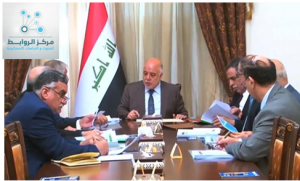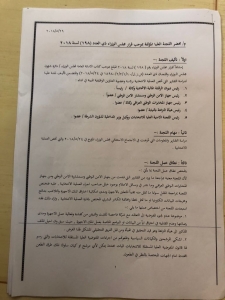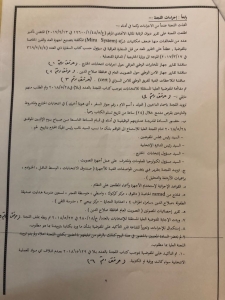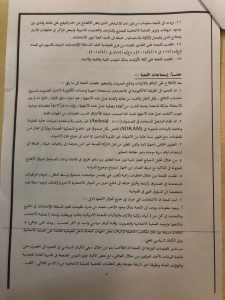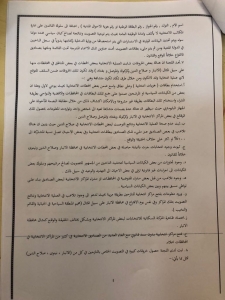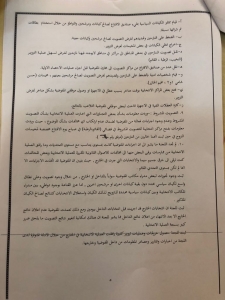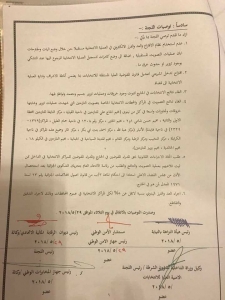The Council of Ministers approved the recommendations of a government committee to investigate breaches in the elections, and Iraqi Prime Minister Haidar al-Abadi said on Tuesday that “serious breaches” took place in the parliamentary elections held on 12 May last, and the government approved the recommendations of the Higher Ministerial Committee on these breaches, in conjunction with the Supreme Judicial Council’s assertion that the results can not be annulled. Abadi stressed at a press conference that some members of the Electoral Commission will be prevented from traveling abroad without his permission. He said he initially supported moving forward with the political process after the elections, “because every year or every election registers violations and we leave the matter to the Electoral Commission to investigate violations and complaints.” He said he was concerned, however, after reviewing the findings of the ministerial committee’s report. He also said that “the ongoing investigations into allegations of electoral fraud may soon lead to the issuance of orders against officials of the Commission.”
The Information Office of the Iraqi Prime Minister said in a statement that the ratification of the violations included the following recommendations:
First, not to use the electronic system of polling, counting and sorting in the electoral process in the future, through the development of mechanisms and proposals during the future voting process, in addition to the cameras to register the electoral process for reference when complaining of the existence of fraud or breach.
Second: Proposing legislative intervention to amend the IHEC law to ensure that the supervision and administration of the electoral process is vested in judges.
Third: – Abolition of the results of the elections abroad to prove that there are serious and deliberate violations and frauds and collusion.
Fourth: Dismantling the results of the voting in the polling centers and stations for the voting of the displaced people, which witnessed the rigging and widespread violations in Nineveh and Anbar.
Fifth: Requesting the legal procedures against the commissioners abroad and the authorized directors of the electoral centers at home who have proven their manipulation of the voting process and the results and the request of the Presidency of the Public Prosecution to move the criminal complaint after obtaining the permission from the Supreme Judicial Council based on the provisions of article 3 / b of the Code of Criminal Procedure No. 23 of 1971 for those who are abroad.
Sixth – the manual counting and sorting by not less than 5% for all polling stations in all governorates for the purpose of the audit and intersection.
Not only do the legal proceedings against commissioners and managers at home and abroad, but include all those involved in counterfeiting such as politicians, brokers or deputies, lifting immunity and preventing them from traveling and referring them to the criminal courts.
In view of the importance of the minutes of the Supreme Committee, the Rawabet Center for Research and Strategic Studies published the Committee’s report at the bottom of the report.
The question that arises in this context: What is the meaning that the Prime Minister of Iraq, Haidar Abadi, approves the recommendations of the government Committee to audit the violations in the elections, knowing that his list got the third ranking among the winning electoral lists in the parliamentary elections?
This indicates that Haidar al-Abadi is not just a political man who seeks only to strengthen his personal gains. If Iraq were seen from that perspective, he could have tolerated these violations as long as he was present in the political process, but his rejection of these violations and frauds during the election process Indicates that he is a state man seeking to preserve the interests of the Iraqi state, because he realized that through his experience in the rule of Iraq since 2014 and until now, an experience was not easy at all, and reached through his rule to the conviction that the constitutional authorities in Iraq if they don’t express the will of the people and their legitimacy , it will be questionable as a result of fraud of the will of its people, it is not able to bear the responsibility of governance and its consequences, and therefore the result is a weak Iraq can not cope with the crises and challenges that may be exposed at home and abroad. It is not the interest of a central state in the Arab and regional environment such as Iraq to be managed or controlled by “politicians” served by the current circumstances of Iraq to lead and control the legislative power, which is the most important authority in the republican parliamentary and democratic system , from which the executive authority emanates , how can these two authorities be run on the basis of false parliamentary election results based on the results of a fake parliamentary elections? This is a disaster, so Haidar Abadi took his courageous and dare stance to address these consequences, which may have a negative impact, if left, on the present and future of Iraq. This is unacceptable to a state man like Haidar al-Abadi.
Iraqi Studies Unit
Rawabet Center for Research and Strategic Studies

